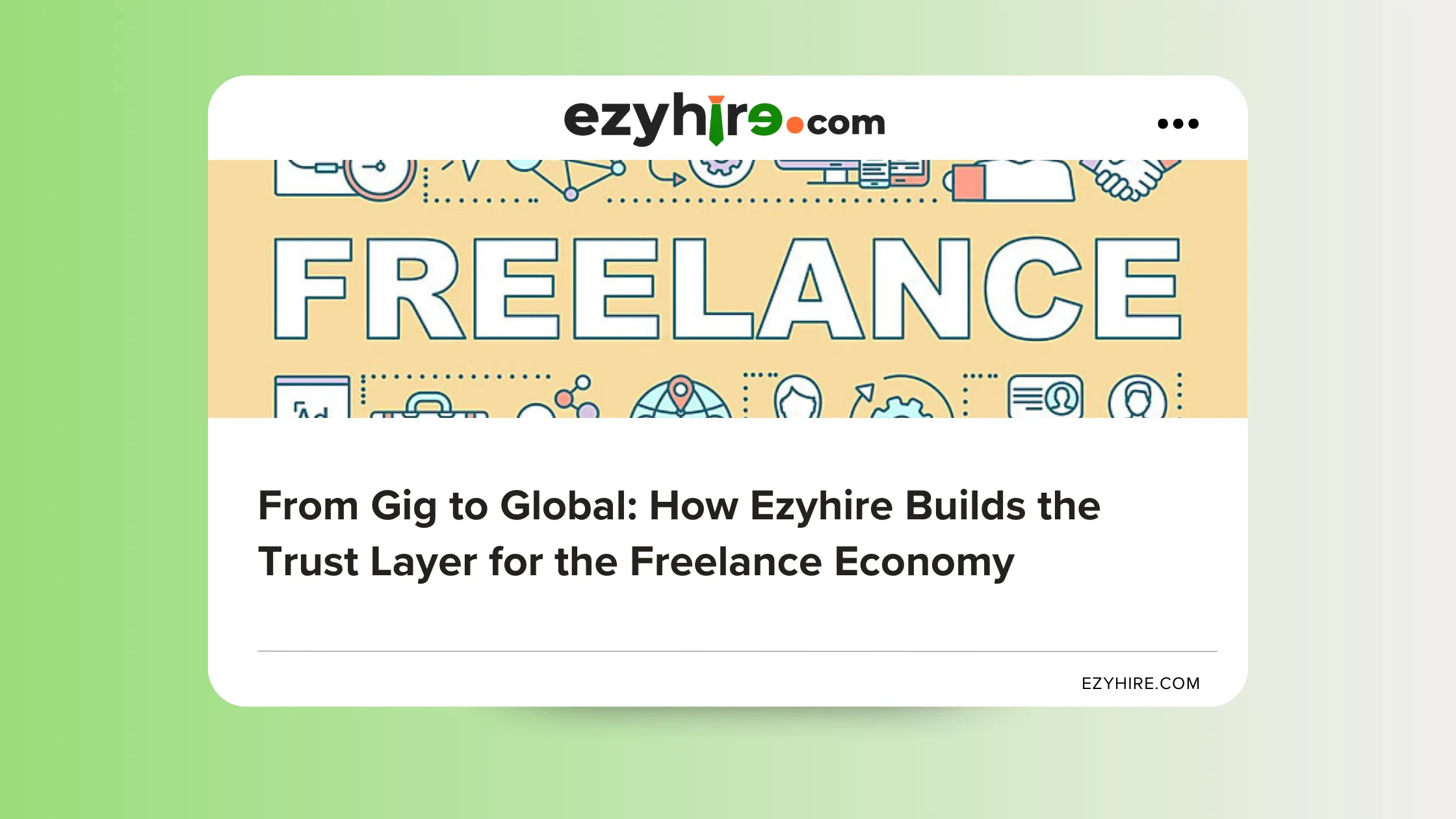Introduction: Why the Future of Work Is Borderless
The freelance economy is no longer just a side hustle trend. It is now one of the most powerful forces reshaping the way businesses hire, innovate, and scale. Globally, 1.57 billion people are freelancing, representing nearly 47% of the entire workforce. In the United States alone, freelancers contributed over $1.5 trillion in 2024, making up almost 5% of the nation’s GDP. That is more economic value than entire industries such as construction or transportation.
And the growth is only accelerating. By 2027, more than half of the U.S. workforce will be freelancing. For ambitious companies, engaging this borderless pool of talent is no longer optional. It is a strategic necessity.
But there is a catch. As businesses embrace distributed teams, the traditional tools of trust built for full-time, local employees simply cannot keep up. Outdated verification processes fail in a world where a designer in Manila, a data scientist in Warsaw, and a developer in São Paulo could all be working for the same company. This creates what experts are calling the trust deficit—a dangerous gap between opportunity and risk.
The answer lies in building a trust layer for the global freelance economy, and that is exactly where Ezyhire is stepping in.
Why Freelancers Are Becoming Your Most Strategic Hires
Freelancers are no longer seen as cost-saving stopgaps. They are at the heart of business strategy.
The CEO Perspective
Nearly 48% of CEOs say they plan to increase reliance on freelance talent in the coming year, with 29% calling freelancers essential to their operations. Even more striking, 78% of CEOs believe their top freelancers add more value than degree-holding full-time employees.
In fact, when companies cut costs during downturns, 40% replace laid-off employees with freelancers, and 53% shift traditional roles into contract positions. The old model—where permanent employees were the core and freelancers filled the gaps—has been flipped. Today, freelancers often hold the most specialized and business-critical roles.
And the numbers back this up: U.S. freelancers earn an average of $99,230 annually, a clear indicator that businesses are willing to pay top dollar for elite independent professionals.
Why the Best Skills Are Found in Freelancers
Freelancers aren’t just numerous—they are leading the charge in adopting the technologies of the future. For example:
- 84% of freelancers are excited about AI adoption, compared to lower enthusiasm among traditional workers.
- Gen Z freelancers are adopting generative AI tools 50% faster than full-time employees (61% vs. 41%).
- The fastest-growing freelance skills on platforms today include machine learning, AI modeling, scripting, automation, and renewable energy expertise.
This adaptability is generational. Over 53% of Gen Z workers freelance full-time, and more than 87% say they prioritize roles that help them learn new skills. Perhaps most telling, 64% of freelancers would not return to a traditional 9-to-5 for any salary.
For companies, this means that freelancers are not a stopgap—they are the future-ready workforce.
Freelancers as the New Engine of Global Expansion
The freelance economy has also transformed how companies scale globally.
Rather than spending months setting up a foreign subsidiary, businesses are now hiring freelancers to enter new markets, build specialized teams, and access executive-level expertise—all without committing to physical offices or heavy overhead.
The hiring trend shows just how borderless talent has become:
- North American companies increased hiring freelancers in Eastern Europe by 106%, in the Middle East and North Africa by 60%, and in Asia by 39%.
This creates enormous opportunity. But it also highlights a new reality: businesses now need a way to standardize trust across borders, ensuring compliance, security, and quality in dozens of different legal systems.
The Trust Deficit: Why Hiring Freelancers Feels Risky
The freelance economy thrives on speed and scale, but that same speed has created a dangerous trust gap.
Identity Fraud and the Rise of “Ghost Contractors”
Fraudsters today use AI to create fake profiles, generate realistic headshots, and even conduct AI-assisted interviews. This has given rise to “ghost contractors”—freelancers who secretly outsource the work to cheaper, unqualified workers. The result? Poor-quality work, lost time, and leaked intellectual property.
And this is not rare. One in four Americans report being victims of fraud on gig economy platforms. Over 55% of job scam victims lose money directly, and more than 21% experience identity theft.
Add to this the thriving fake degree industry and the fact that 30% of candidates admit exaggerating credentials, and businesses are left navigating a minefield of misrepresentation.
Compliance Challenges
Hiring globally brings massive compliance risks:
- Worker misclassification can lead to penalties up to 35% of the worker’s tax bill, and in some cases, even criminal charges.
- Co-employment risks can expose companies to lawsuits, even when freelancers are sourced through third parties.
- Labor laws vary by country, meaning a contract valid in the U.S. may be completely unenforceable in Germany or Brazil.
For startups hiring just a few contractors, this might seem manageable. But for companies scaling across multiple markets, this patchwork quickly becomes impossible to manage manually.
Security Risks
Freelancers often get access to sensitive data, proprietary systems, or even core intellectual property. Without airtight contracts, the IP technically belongs to the freelancer, not the company.
Worse, inadequate offboarding leaves many freelancers with lingering access to systems long after projects end. This creates persistent backdoors into company data, opening the door to breaches, leaks, and regulatory fines.
How Ezyhire Provides the Trust Layer for the Global Freelance Economy
Solving these risks requires more than patchwork fixes. It requires infrastructure for trust. That’s where Ezyhire comes in.
Step 1: Verifying Identity with Precision
Ezyhire’s PhotoID Verification ensures that every freelancer is who they claim to be. Covering 130+ countries, it uses AI to go far beyond a simple ID scan.
- Advanced Liveness Detection checks for biological cues like blinking and micro head movements, blocking deepfakes and static images.
- Tamper and Spoof Detection identifies digital alterations, screen photos, and fake IDs.
- Document Authentication validates official IDs against global databases.
- Facial Recognition Mapping compares live selfies with ID photos using key facial landmarks for high-accuracy matching.
This layered system provides certainty at scale, transforming anonymity into authenticity.
Step 2: Comprehensive Background Verification
Identity is just the beginning. Ezyhire’s Background Verification (BGV) suite gives businesses a full picture of their global workforce.
- Criminal Record Checks safeguard workplaces from high-risk hires.
- Global Watchlist Screening ensures compliance with AML and counter-terrorism regulations.
- Education and Employment Verification tackles credential fraud by confirming qualifications directly with institutions and past employers.
This makes it possible to apply consistent, high-quality vetting standards worldwide.
Step 3: An Integrated, End-to-End Framework
What makes Ezyhire powerful is not just its tools but their integration into one seamless workflow. Identity checks, background verification, and skills assessments all flow together.
Add in Employer of Record (EOR) services, and Ezyhire becomes a complete solution for hiring, paying, and managing freelancers anywhere in the world—while staying compliant.
This removes compliance bottlenecks, accelerates hiring, and gives companies the confidence to engage the best talent without fear.
The following table outlines how Ezyhire’s specific solutions directly mitigate the primary risks associated with hiring a contingent workforce.
| Risk Category | Specific Threat Example | Ezyhire’s Mitigation Solution |
| Identity Fraud | An individual uses an AI-generated persona or a stolen identity to secure a contract. | AI-Powered PhotoID Verification: Employs multi-factor liveness detection (blinking, head movement), advanced tamper checks, and biometric facial recognition across 130+ countries to confirm the subject is real, present, and the true owner of the identity document. |
| Credential Misrepresentation | A candidate claims a falsified university degree or exaggerates their role and tenure at a previous company. | Background Verification (BGV): Conducts direct-to-source Education Verification with academic institutions and Employment Verification with past employers to definitively confirm credentials, job titles, and work history. |
| Security & Compliance Risk | A company unknowingly hires an individual who is on an international sanctions list or has a disqualifying criminal history. | BGV: The Global Watchlist Check screens against hundreds of international security and regulatory databases, while the National Criminal Database Check provides essential safety assurance for the business and its stakeholders. |
| Operational & Quality Risk | A business onboards a fraudulent or unqualified “ghost contractor” for a mission-critical project, leading to project failure. | Integrated Platform: A unified workflow combines technical skills assessments with mandatory ID Verification and BGV, ensuring that only authentically identified, fully vetted, and properly qualified talent proceeds through the hiring funnel. |
Conclusion: Building a High-Trust Future of Work
The freelance economy is not a trend—it is the new foundation of the global workforce. By 2027, freelancers will outnumber traditional employees in the United States, and similar shifts are happening worldwide.
But without trust, this opportunity becomes a liability. Fraud, compliance failures, and security breaches are the silent killers of global growth.
Ezyhire solves this by providing the trust layer the freelance economy desperately needs. With AI-powered identity verification, robust background checks, and integrated compliance solutions, businesses can hire globally with the same confidence they would locally.
The message is clear: the future of work is flexible, borderless, and freelance-driven. But it will only thrive on a foundation of trust. With Ezyhire, companies can stop worrying about risks and start focusing on growth, innovation, and building world-class teams.
Ready to Hire Without Fear?
The freelance economy is rewriting the rules of work, but only companies that build trust into their hiring will lead in this new era. With Ezyhire’s free trial, you can experience firsthand how easy it is to verify talent, stay compliant, and scale globally with confidence.
Start your free trial today and see how Ezyhire transforms the way you hire.
Or, if you’d like a guided walkthrough, book a free demo with our team and discover how we can help you de-risk your hiring process while unlocking access to the world’s top freelancers.

